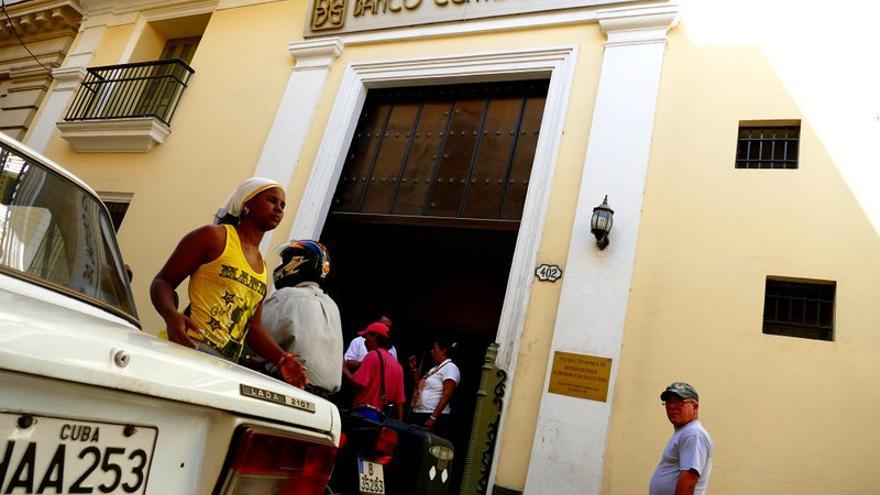
![]() 14ymedio, Manuel Calvo, Santiago de Cuba, 25 October 2020 — Money in the form of hard currency comes into their accounts at the International Financial Bank, but they are not issued magnetic cards or given cash to be able to spend it in the stores that take only ’freely convertible currency’ (MCL). This is the distressing situation facing the Protestant Churches in Santiago de Cuba, leaving them unable to acquire the supplies they need for their personnel and their religious activities, according to the statements collected by 14ymedio.
14ymedio, Manuel Calvo, Santiago de Cuba, 25 October 2020 — Money in the form of hard currency comes into their accounts at the International Financial Bank, but they are not issued magnetic cards or given cash to be able to spend it in the stores that take only ’freely convertible currency’ (MCL). This is the distressing situation facing the Protestant Churches in Santiago de Cuba, leaving them unable to acquire the supplies they need for their personnel and their religious activities, according to the statements collected by 14ymedio.
This situation, which apparently also affects churches in the rest of the country, has been complicated by the Government’s decision to give priority to supplying the retail and wholesale stores the sell only in the newly created MLC magnetic cards, which has led to a brutal shortage of supplies in the stores where purchases can be made in Cuban pesos (CUP) and Cuban convertible pesos (CUC). Not having access to their funds in foreign currency, means these religious institutions cannot obtain the necessary products to support their activities.
In July, the United Evangelical Lutheran Synod Church in Cuba received resources from the Evangelical Lutheran Church in America (ELCA) to finance a humanitarian project, to address the situation created by Covid-19. With this help, the congregation was able to punctually deliver pork and medicines purchased at the city’s international pharmacy, and also to distribute money directly to 300 families.
But all these operations had to be carried out in CUC or CUP and with great difficulties ,due to the shortages of supplies in the stores that sell in the two national currencies.
Bishop Ismael Laborde Figueras, of the Lutheran Church in Santiago de Cuba, has made several efforts with the BFI, all without success, and has been one of the most insistent voices to ask for magnetic cards or cash access to funds deposited in that bank, the only bank authorized to receive donations from abroad.
The BFI has asked for “patience” and has explained that it is waiting for an authorization from the Central Bank, which still has not arrived months after starting the procedures. The bank also did not comply with the bishop’s request to withdraw $500 to buy supplies and pay staff for a spiritual retreat.
The BFI manager in Santiago’s provincial capital explained that he had no permission from the national level to deliver foreign currency in cash nor the corresponding amount on MLC cards.
“Our hands are tied because much of what we need to help the most vulnerable or to organize our retreats can now only be found in the ’dollar markets’,” said one of the members of the Lutheran Church who requested anonymity. “It’s been a long time and nothing is resolved, but it should not be like that because that is our money.”
“Products as simple as flour, coffee or toilet paper can now only be bought in foreign currency,” says the priest. “Even rice is no longer for sale in Cuban pesos, so when we organize a lunch for the elderly or prepare a meeting that includes food, we are required to have a card loaded with dollars.”
This religious institution recently received a donation from the Lutheran Church of Norway and is in the process of receiving a donation from the Lutheran World Federation, in addition to negotiating a second project with ELCA, another with churches in Norway, and one more with the Lutheran World Federation by 2022. If all of them materialize, the funds will accumulate in the BFI account, without any possibility of using them.
All these projects are intended to channel the distribution of food and cleaning products, as well as to finance psychosocial support activities, tasks that are becoming increasingly difficult due to the shortages that afflict the nation’s entire network of stores that take CUC and CUP.
______________
COLLABORATE WITH OUR WORK: The 14ymedio team is committed to practicing serious journalism that reflects Cuba’s reality in all its depth. Thank you for joining us on this long journey. We invite you to continue supporting us by becoming a member of 14ymedio now. Together we can continue transforming journalism in Cuba.
